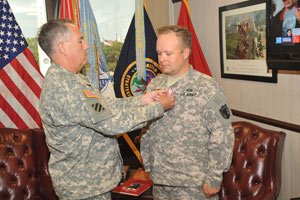Recently
- 10/4/2012
Successful Global Positioning System IIF-3 Launch from Cape Canaveral AFS - 9/25/2012
Official Reaffirms DOD Commitment to Cybersecurity - 9/18/2012
65th U.S. Air Force Birthday Message - 8/28/2012
Mobilizing American Ingenuity To Strengthen National Security: A Challenge to the Public
Archived News
USSTRATCOM Soldier recognized for helping save hiker
Staff Sgt. Daniel MartinezU.S. Strategic Command Public Affairs
7/19/2012
 OFFUTT AIR FORCE BASE, Neb. – Maj. Gen. William Grimsley, Chief of Staff, U.S. Strategic Command, pins the Defense Meritorious Service Medal on Maj. Geoffrey DeWeese, Staff Judge Advocate Directorate, USSTRATCOM, to recognize him for helping to save the life of a hiker during a hiking trek on Mount Whitney. Major DeWeese helped guide a hiker to safety after he came down with a high altitude related illness. Mount Whitney is the highest summit in the contiguous United States located in California's Sierra Nevada Mountain Range. (Photo by Steve Cunningham)
OFFUTT AIR FORCE BASE, Neb. – Maj. Gen. William Grimsley, Chief of Staff, U.S. Strategic Command, pins the Defense Meritorious Service Medal on Maj. Geoffrey DeWeese, Staff Judge Advocate Directorate, USSTRATCOM, to recognize him for helping to save the life of a hiker during a hiking trek on Mount Whitney. Major DeWeese helped guide a hiker to safety after he came down with a high altitude related illness. Mount Whitney is the highest summit in the contiguous United States located in California's Sierra Nevada Mountain Range. (Photo by Steve Cunningham)OFFUTT AIR FORCE BASE, Neb. – Army Maj. Geoffrey DeWeese remembers the night of Wednesday, Sept. 28, 2011 well. What began as a beautiful day hiking with a friend in a rugged, mountainous terrain soon became an exhausting trek to save a stranger’s life.
Major DeWeese, assigned to U.S. Strategic Command’s Staff Judge Advocate Directorate, was recently recognized and awarded the Defense Meritorious Service Medal by Maj. Gen. William Grimsley, Chief of Staff, USSTRATCOM, for his part in the hiker’s rescue.
The major recalls the event that led him to receive his award. It started when he noticed headlamps in the distance as nightfall closed in on Mount Whitney, the highest summit in the contiguous United States located in California’s Sierra Nevada Mountain Range.
“As it began to get dark, we talked to someone who was waiting for their friends to come down the mountain. Soon it became dark enough that headlamps could be seen up on the slope,” he said.
He noticed the movement of lights traveling down the mountain, but further up something didn’t seem right.
“We noticed another group of three lights pretty high up, around the cable area, and they had stopped moving. As it got darker and darker and the lights didn’t seem to move any more, my friend Troy and I became concerned,” he said.
Major DeWeese and his friend, Maj. Troy Stabenow, an Army Reservist and assistant federal public defender in Jefferson City, Mo., ascended toward the dormant glow in the distance to investigate. They found three men, one who was exhausted and whose condition was serious.
“His words were slow and slurred, his pupils were dilated and he generally seemed out of it,” Major DeWeese said. “His friends seemed to think he was just tired, but Troy and I could tell more was going on. He couldn’t give us his name or say where he was from and he was clearly disoriented. We figured he probably had extreme altitude sickness or even high altitude cerebral edema.”
Both majors, who are experienced hikers, have felt the effects of altitude sickness and used that knowledge to their advantage. Major Stabenow once came down with an early stage of HACE while trekking in the Himalayas, but recognized the symptoms and turned around and climbed down to a lower altitude to avoid exacerbating it. The man they were assisting didn’t realize he was making his symptoms worse by continuing up the mountain even after he started to feel ill.
“HACE can be fatal if untreated, and the best treatment is to descend,” Major DeWeese said. “We sent his friends on ahead and told them to see if someone could locate the ranger and call for help.”
The man was given water and an extra pair of Gore-Tex pants and a parka by the major’s to help keep him warm. After they sent his friends off, they began the physically challenging journey of guiding him down the mountain. Major Stabenow walked ahead to light up the path in near pitch darkness while Major DeWeese helped the disoriented man walk steadily and safely down.
“Initially, I tried to hold his arm up and provide support from the side, but the trail is very narrow and rocky and that was hard,” he said. “At that point I moved directly behind him, put my arms under his armpits and held him up from behind. This was pretty hard both physically as I was helping to hold up his weight, and logistically as I was trying to time my steps down a rocky trail … It is narrow and if you trip you could take quite a tumble down the side of the mountain, so I had to be extra careful to move slowly to keep the man moving and to be sure I didn’t trip while holding him.”
Eventually two other hikers came to assist and Major DeWeese went out on his own to find the ranger. Once he was able to locate him, the ranger provided a sleeping bag for the man. They decided to camp out since it was too dark and dangerous to continue on, but the man was given a meal and anti-nausea medicine and was working on rehydrating himself.
 MOUNT WHITNEY, Calif. – Army Maj. Geoffrey DeWeese, Staff Judge Advocate Directorate, U.S. Strategic Command, and Maj. Troy Stabenow, Army Reservist and assistant federal public defender in Jefferson City, Mo., take a photo with a member of the Inyo County Search and Rescue Team after assisting a hiker who came down with a high altitude related illness Sept. 29, 2011. Mount Whitney is the highest summit in the contiguous United States located in California's Sierra Nevada Mountain Range. (Courtesy photo)
MOUNT WHITNEY, Calif. – Army Maj. Geoffrey DeWeese, Staff Judge Advocate Directorate, U.S. Strategic Command, and Maj. Troy Stabenow, Army Reservist and assistant federal public defender in Jefferson City, Mo., take a photo with a member of the Inyo County Search and Rescue Team after assisting a hiker who came down with a high altitude related illness Sept. 29, 2011. Mount Whitney is the highest summit in the contiguous United States located in California's Sierra Nevada Mountain Range. (Courtesy photo)By morning, two search and rescue team volunteers made their way to the camp. A helicopter was called to assist in the rescue.
“We helped carry him in a stretcher to the helicopter and they flew him down to the valley below to a hospital,” Major DeWeese said. “The search and rescue team said we probably saved his life. Even if he hadn’t died directly from the HACE, with the dropping temperatures added, he was in danger of hypothermia and if he had tried to move he could have easily fallen off the edge of the trail and seriously injured or killed himself.”
Major DeWeese’s word of advice for anyone who considers hiking is to be prepared by always having enough food and water, having adequate clothing for dramatic weather or temperature changes, and to be knowledgeable of the risks.
“To be safe you must always be ready to turn back when you’re climbing. That applies to inclement weather conditions and physical conditions that exceed your abilities and experience,” he said.
A member of the search and rescue team lauded Majors’ DeWeese and Stabenow for their help.
“These guys knew what they were doing, were prepared and made the effort to help when many others decided to walk on by,” said Cpl. Terry Waterbury, Inyo County Search and Rescue. “I am pretty sure they feel good about helping save another life, people like them really do make a difference in the world.”
